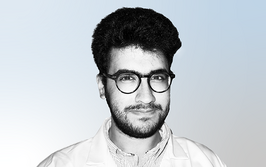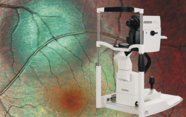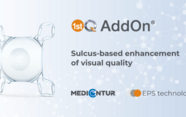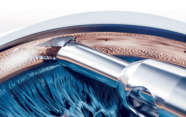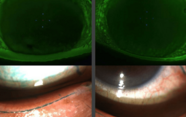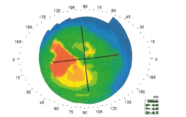Jumping After Your Passions
Sitting Down With… Janey Wiggs, Paul Austin Chandler Professor of Ophthalmology and Vice Chair for Clinical Research, Harvard Medical School/Massachusetts Eye and Ear, Cambridge, Massachusetts, USA
Jon Greenaway, Aleksandra Jones | | 7 min read | Interview

When did you first consider becoming a physician? Did you have any role models?
I was actually the first person in my family to go to a four-year university. I was really fascinated by science, so I spent time in an undergraduate research laboratory and then went to graduate school for a PhD in biochemistry and molecular biology. It was during that time that I realized the impact molecular biology in particular can have on humans. I became really interested in inherited disorders so, at that point, I decided to go to medical school.
When did you decide to focus on ophthalmology?
Ophthalmology was the result of my collective experiences in medical school. I really enjoyed medicine, surgery, and pathology. I enjoyed taking care of both young people and older people. Ophthalmology is one of few disciplines in which you can do all of those things. As an additional factor, there are a number of inherited ocular disorders that fascinated me because of my interest in human genetics, so ophthalmology presented a perfect opportunity to combine my clinical and research interests.
What highlights do you recall from your residency or fellowship days?
The answer to this question also explains how I came to study glaucoma. Initially, I worked with Ted Dryja as a pre-residency fellow, studying the retinoblastoma gene. Working on retinoblastoma introduced me to inherited retinal disorders, and I had in mind that I would pursue these diseases in the future. However, when I was a senior resident I became fascinated by glaucoma. It’s a very complex disease that is interesting clinically and genetically. At that point I shifted my focus from retina to glaucoma and in particular the study of genes that cause or predispose to glaucoma.
Have you ever imagined following a different path in life?
When I was a little kid, I was always outside doing stuff. One of the things I did was collect rocks, so I had an enormous rock collection (that my mother was not thrilled about moving years later when she left our childhood home). I’ve always been interested in the natural world. When I first started college, I planned to be a chemical engineering major because I felt a social responsibility to develop alternative fuels or maximize opportunities to resource existing fuels. It’s a field that is strongly related to geology, which has always interested me – and still does, but these days only as a hobby.
Was there ever a moment when you knew you made the right choice?
At the moment, pretty much every week! We’ve had amazing success in understanding the genetics of glaucoma and uncovering new insights into the genetic etiologies of the disease. I think one of the things that has been most rewarding is the fact that we now have a collection of genes that we know cause inherited early-onset forms of glaucoma – either autosomal dominant or autosomal recessive. It has been wonderful to do genetic testing for some of the families we see because we can give them real information about disease risk for individuals in the family. We can tell them that not all of the children are at risk and we can identify those who are and develop appropriate treatment plans for them. We can also reassure the children who don’t carry disease-causing mutations (and, of course, their parents). That has been a really important and exciting thing to do.
What have been your greatest achievements?
Family is probably the most important thing for everyone and I’m certainly no exception. I have a wonderful family; I am fortunate to have healthy and productive children and a supportive husband, and I am very grateful for them.
What will make the biggest difference in glaucoma in the next few years?
I think an amazing advance in genetics overall has been the concept of the polygenic risk score. This approach has developed over the last four to five years. It has been amazing to watch and it’s highly applicable to glaucoma.
The polygenic risk score basically measures the background genetic burden for disease based on genome-wide association studies that we and others have done. People who have a really high burden of glaucoma-associated genes tend to have earlier onset of disease, more severe disease, and are more likely to require surgical treatment. This is exciting for our field because, one, there are so many people at risk for glaucoma and two, it’s so difficult to screen populations to identify people at early stages of disease when current treatment is actually effective. The polygenic risk score gives us a real opportunity to stratify people according to risk. After all, even if not everyone in the highest genetic burden percentiles goes on to develop glaucoma, it gives us an opportunity to screen those people more efficiently and, eventually, better identify people who are more likely to develop the disease. I think this is going to make a significant difference in the way we care for patients going forward.
How important is teaching to you?
Teaching and mentoring is something I really value. It’s a wonderful experience to help a young person get their first grant or write a critical paper that moves them forward in their career. I’ve had the opportunity to mentor many people and I have enjoyed it a lot. I think it’s an important thing for us, as we gain seniority in our careers, to use our experience and impact to support the career development of younger clinician-scientists.
Who have been the most important figures in your career?
A number of people have been really important for my career development. I think one of my most important early mentors was Ted Dryja, in whose lab I worked as a fellow. He taught me a lot about critical scientific thinking and gave me the opportunity to apply human genetics to disease in a way that really helps patients. The year that I worked in his lab was remarkable and had a tremendous impact on my development. The next person was David Epstein, who was the head of the glaucoma service when I was a Mass Eye and Ear resident and clinical fellow in glaucoma. He was a thinker who really understood the pathophysiology of glaucoma and would challenge his fellows to think critically about the disease process and what was causing the phenotypes we saw in patients. He was also an amazing leader who taught me a lot about leadership. The third person is my current chair, Joan Miller, who was one of the first women chairs in ophthalmology. Joan has always been a strong supporter of women and an amazing mentor. She is an incredible role model for clinician-scientists and especially for women.
What messages do you have to ophthalmologists at the start of their careers?
Find your passion and follow it. When the field of glaucoma genetics was first developing, I told David Epstein I wanted to study glaucoma genes – and, honestly, the field was at such an early stage that this decision was a big academic risk. But he was very supportive. He told me, “Well, that is your passion and you should follow it.” And that’s exactly what I would say to young people, because you need to be passionate about what you do. When you’re excited about something at work every day, it’s not just a job; it’s part of your life. My job is something I look forward to every day and I want young clinician-scientists to feel the same way.
What are your interests outside of work?
I love riding my bike. My commute is about 10 miles each way and I ride my bike almost every day (there are some exceptions in the winter!). I really enjoy long bike rides; I do a 100-mile bike ride every summer with my son and, this summer, I also did a 60-mile bike ride around Lake Winnipesaukee in New Hampshire. I also enjoy playing the flute. My best days are when I have time to spend with my family and my two black Labrador dogs.

